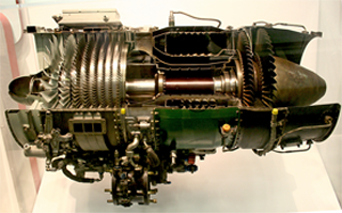 Turbojet Engine |
This group of materials, is primarily used in extremly high temperature and/or corrosive environments, such as jet engines, power generation applications, chemical plants and oil rigs. Typically, nickel alloys or cobalt alloys are used in environments where the use temperatures are in access of 1000 degrees F.
Due to their chemical compositions, materials tend to be quite expensive, with long lead times from the mills. Steel service centers tend not carry large inventories of expensive materials, sometimes making it difficult to obtain, particularly in immediate repair situations.
Some of the more well-known trademarked alloys include Inconel, Hastelloy, Monel, Nitronic, CBS600, Haynes188, L605, and Rene 41. These also tend to be price volatile with the longest mill lead times, as much as 52 weeks or more.
* There three common types of nickel alloys which are formed for different applications:
Nickel chromium, Nickel copper, and Nickel iron
The nickel chromium base alloys are used extensively in applications where heat resistance and/or corrosion resistance is required. In some members of the group, where conditions are less demanding, some nickel is replaced by iron to decrease the overall cost.
Metals fail at high temperatures by both oxidation (scaling) and through a loss in strength. Alloys in this class are designed to resist failure from both of these mechanisms.
Where corrosion resistance is significant, molybdenum is used as an alloying addition in nickel chromium based alloys.
This group of alloys are frequently sold under trade name specifications but most are listed in the Unified Numbering System. Common trade names are HASTELLOY, INCOLOY, and INCONEL.
The more recent nickel chromium base alloys in these groups also have a wide range of ancillary elements added to give special properties - some of these can be quite complicated and require very close control over composition and heat treatment
.png)






![[Most Recent Quotes from www.kitco.com]](http://www.kitconet.com/charts/metals/base/nickel-d.gif)



